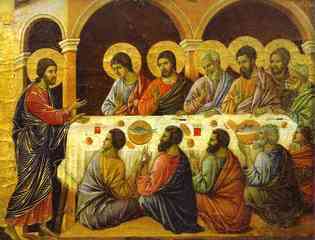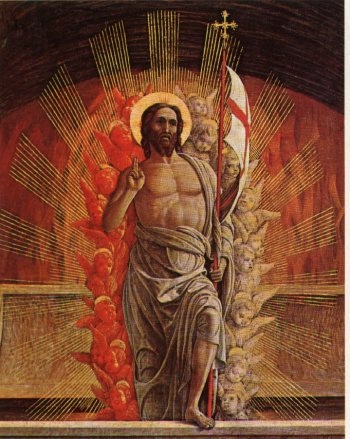
Sermon by St. Ambrose the Bishop
We see here the marvellous nature of the Lord's glorified body, which could pass through an impenetrable thing. It could enter unseen, and then become visible. It could easily be touched, but its nature was (and is) hard to understand. Hence the disciples were affrighted, and supposed that they had seen a spirit. And therefore the Lord, that he might shew us the evidence of his resurrection, said: Handle me, and see; for a spirit hath not flesh and bones as ye see me have. From which we can perceive that it was not by virtue of a disembodied state, but by the peculiar qualities of his risen and glorified body, that he had passed through closed doors. For that which is touched or handled is a true body.
And we, also, shall all rise again in the body. For it is sown a natural body, it is raised a spiritual body. The spiritual body is the finer, and the natural body is the grosser, besodden as yet by the corruption of earth. Was not that a real body, wherein remained those marks of his wounds, those holes of the nail-prints which the Lord bade his disciples to handle? Hereby, also, he hath not only strengthened our faith, but hath also quickened our love. For we know that it was his will not to do away with those wounds which he bore for our sake; but rather to carry them into heaven, so that he might plainly shew the Price of our Freedom unto his eternal Father. Such an one is he, marked with these wounds, and himself the Trophy of our Salvation, unto whom the Father hath therefore said: Sit thou on my right hand. And such are also the Martyrs, whose Crown he is, and concerning whom he hath shewn us that they will ever be with him there.
And now, since our Lesson from Luke here faileth to tell us anything more on this point, let us have recourse to John, and consider how that, according to him: Then were the disciples glad, when they saw the Lord: for it was thereby that they received the grace of faith. According to Luke, he called attention to their unbelief. But according to John he said also: Receive ye the Holy Ghost. However, Luke not John, hath: Tarry ye in the City of Jerusalem, until ye be endued with power from on high. Indeed to me it seemeth as though John as an Apostle had busied himself with the greater and higher matters, and that the Evangelist Luke had concerned himself with the narrative, and such things as are more human. Thus Luke writeth with historical fulness whereas John given an abridgement of the historical matter. For even as it is impossible to doubt the word of him who testifieth of these things, and concerning whom we know that his testimony is true, so is it sinful to think of negligence or falsehood as attaching to the other, even Luke, who earned to himself to be an Evangelist, albeit he was not an Apostle, and therefore we hold that both are truthful, neither are they at variance one with the other, either in the difference of the words they use, or in the sacredness of their characters as Evangelists. For though Luke saith that at the first the Apostles believed not, yet he sheweth that afterward they believed: and although, if we regard only the first fact, the Evangelists seem divergent one from the other, yet, when we consider what cometh afterward, we see that they are at one.





